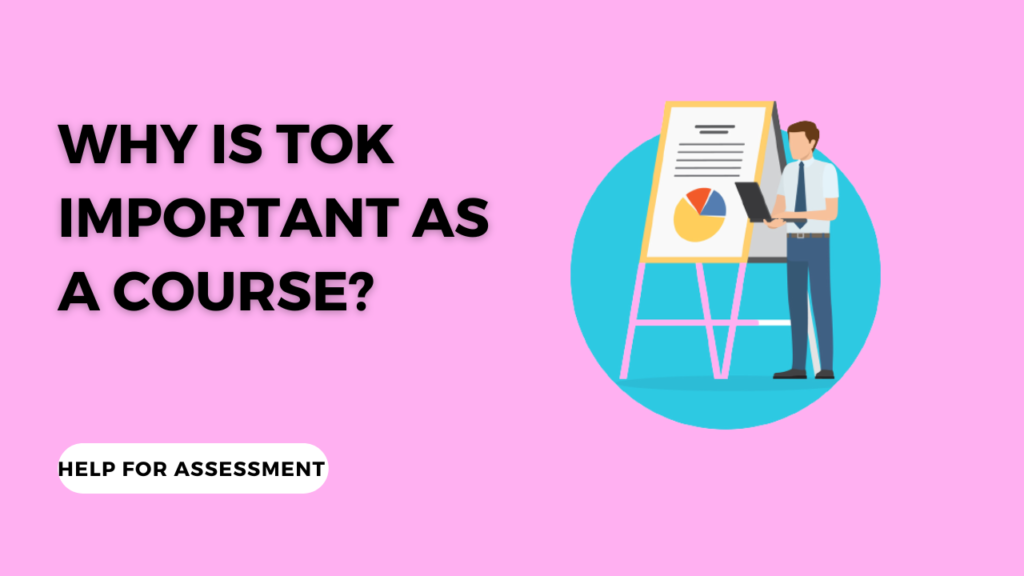The ToK course is important because it teaches students to learn the process through which knowledge is derived. Through TOK, students can question what they learn and what they claim to know, making it easy for them to do some self-reflection.
Instead of thinking literally, ToK requires logical, vertical, and step-by-step thinking, which is why it makes sense to start from what we already known and then work back to the ways of knowing.
Overall, the point of learning ToK in the IB program is to look closely into what we believe or accept as knowledge and then determine if there are flaws in these knowledge systems.
That way, it becomes easy to make sure that false knowledge never circulates around carelessly.
What Does Theory of Knowledge Question?
Theory of Knowledge answers the questions two things:
- What is knowledge?
- How do we know?
By helping you to look at everything in life from a different perspective, the ToK subject easily evokes further speculations and raises more questions about the nature of knowledge and the ways of acquiring knowledge.
From a broad perspective, ToK teaches you to think creatively and critically by placing you in a position to ask questions, make your analysis, and draw reasonable conclusions.
By adding a dimension and depth to analyze what you claim to know, you can discover bias, identify inconsistencies, evaluate claims, compare views, and make conclusions and judgments based on your own thinking rather than on what someone else said.
What Are the Aims of Theory of Knowledge?
The Theory of Knowledge subject has five aims, and they're as follows:
- To courage you to reflect on your personal experiences as an IB student and at the same time make connections between various disciplines and your feelings, thoughts, and actions
- To empower your to develop richness of knowledge and understand the power of reflecting on what you claim to know
- To help you become more aware about the construction, examination, and evaluation of knowledge
- To help you see the value of diversity in the way of living and thinking of communities and individuals
- To not only make it easy for you to know the value and the wealth of knowledge but also recognize just how powerful what you claim to know can be
What Does ToK Require from IB Students?
By the time you complete the IB Theory of Knowledge course, you should be able to:
- Look at knowledge claims from a different perspective and analyze its underlying assumptions and implications
- Show that you recognize and understand the varying opinions on knowledge issues
- Come up with questions, hypothesis, explanations, solutions, and alternative ideas to respond to knowledge issues on AOK, WOK, and your personal experiences as a TOK student
- Not only formulate but also communicate your ideas in a clear way in regards to clarity, honesty, and accuracy
- Show that you accept the concept of self-awareness and can give a personal response to a knowledge issue
- Examine theoretical positions, WoK, cultural values, and AoK, and make reasonable comparison on the varying approaches to knowledge issues
What Are The Fundamentals of Theory of Knowledge?
To take this even further and understand why Theory of Knowledge is an important subject in the International Baccalaureate program, you need to familiarize yourself with the fundamentals of the course.
In particular, you need to understand the following:
1. Areas of Knowledge
In ToK , the areas of knowledge are all about what we know. You can think of them as a body of knowledge that fits well into one system.
Because they have a subtle connection to each other, each of the eight AoKs can broaden your perspective on how we know and give you a clear understanding of the world.
Your goal as an IB student should be to identify this connection and then draw the right parallels.
From an objective standpoint, ToK gives you an awareness of your understanding in each AOK and bridges the knowledge gap by introducing WOKs and creating a relevant link between them.
2. Ways of Knowing in ToK
The ways of knowing in ToK are the means by which we make sense of things around us.
Some other definitions state that WOKs are the means through which we acquire knowledge (or know the things we claim to know).
While there are eight AOKs, you don’t have to worry about mastering all of them at a go. The Theory of Knowledge course requires that you know only four of them.
3. The Principles of Theory of Knowledge
TOK seeks to establish only one thing: how we know what we know.
To arrive to a reasonable conclusion, IB students have to expand this issue by looking at Math, History, Arts, Indigenous Knowledge, Ethics, Human Science, Natural Sciences, and Religious Knowledge.
They the have to learn about these principles through at different areas of knowledge and learning them through the different ways of knowing.
4. Real Life Application of ToK
It’s hard to imagine a world without the Theory of Knowledge in the 21st century.
From the application point of view, the ToK subject enables IB graduates to find solutions to problems in the modern world.
More importantly, the subject empowers you to look at a knowledge issue beyond the surface and it will go a long way to not only make you a great thinker but also enrich the overall quality of your life.
Final Words
As you can see, the ToK subject is an important subject in the IB curriculum and therefore worth pursuing.
While it may be a challenging extracurricular discipline, it’s also an interesting area to explore.

